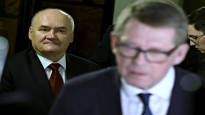The Hungarian delegation’s visit started a developing story that may open the ratification knot between Finland and Sweden, says NATO special reporter Mika Hentunen.
Last week’s NATO ratification hearing in the Hungarian parliament was a confusing spectacle.
13 people attended the speaker’s booth. Among them was the one interviewed by last December, who opposes NATO in principle Előd Novák.
However, the hall of the Országház, which is counted among the most beautiful parliament buildings in Europe, was almost empty. The audience wasn’t interested in fiery speeches.
I followed a strange theater performance. The parliament did not decide how to proceed with this.
In fact, no processing would even be needed. The parliament could vote on the matter at any time, even tomorrow, because the Hungarian government has already approved the NATO membership of Finland and Sweden.
Prime minister Viktor Orbán the coalition of the right-wing party Fidesz and the Christian Democrats supports NATO membership.
The coalition of parties has the necessary majority in parliament for quick decision-making.
Talk about the complexity of the legislative process is unbelievable.
Especially after nine months of procrastination. (you switch to another service)
We don’t know what the Hungarians complained about behind closed doors in Stockholm and Helsinki, but at least on the surface, Hungary has no disputes with the Nordic countries preventing NATO membership.
The disagreements between the countries are related to EU subsidies. Finland and Sweden, like other EU countries, have demanded reforms of the rule of law from Hungary, such as guaranteeing the independence of the judiciary and eradicating corruption.
These reforms are not related to the NATO process, but Orbán’s habit is to mix porridge and vell. So it could be that he has some kind of evening milking going on.
In addition, it seems that Orbán is coordinating his NATO game with Turkey.
Possibly Russia also has a hand in the game.
The Hungarian delegation that visited Finland did not consist of the country’s leading politicians. Of course, they are important decision-makers and most obviously loyal to Orbán.
At least to the media, they did not present a clear agenda of what Finland and Sweden should do. They mostly just showed their anger.
Above all, their visit was seen as a propaganda trick for the Hungarian home audience: Fidesz came to beat Nordics who insulted Hungarians.
Hungary, despite its anger, does not arouse great emotions in NATO.
It is believed that Hungary will return to its roots and ratify at the latest when the Turkish president Recep Tayyip Erdoğan shows a green light.
In this regard, tomorrow Thursday is full of hope for a long time. Finland, Sweden and Turkey will then continue the tripartite talks that have been interrupted for several weeks in Brussels.
Yesterday, Tuesday, the Swedish government submitted the NATO law to the Diet, and on Thursday, the government will outline the terrorism law. The law would prohibit Swedes from participating in the activities of organizations defined as terrorist organizations.
This is exactly what Turkey has put forward as a condition for ratifying NATO membership.
There is also a significant meeting in Washington on Thursday, when the president Sauli Niinistö meet with members of the US Senate Foreign Relations Committee. Chairman of the committee Bob Menendez is the most vocal opponent of Turkish arms sales in the United States.
Turkey wants to buy F-16 fighter jets from the United States.
There are a number of opponents of fighter jet deals like Menendez in Congress. They justify their opposition by worrying that Turkey could use them against America’s Kurdish allies.
An agreement on this fighter jacket could also open the knot of Turkey’s NATO ratifications.
